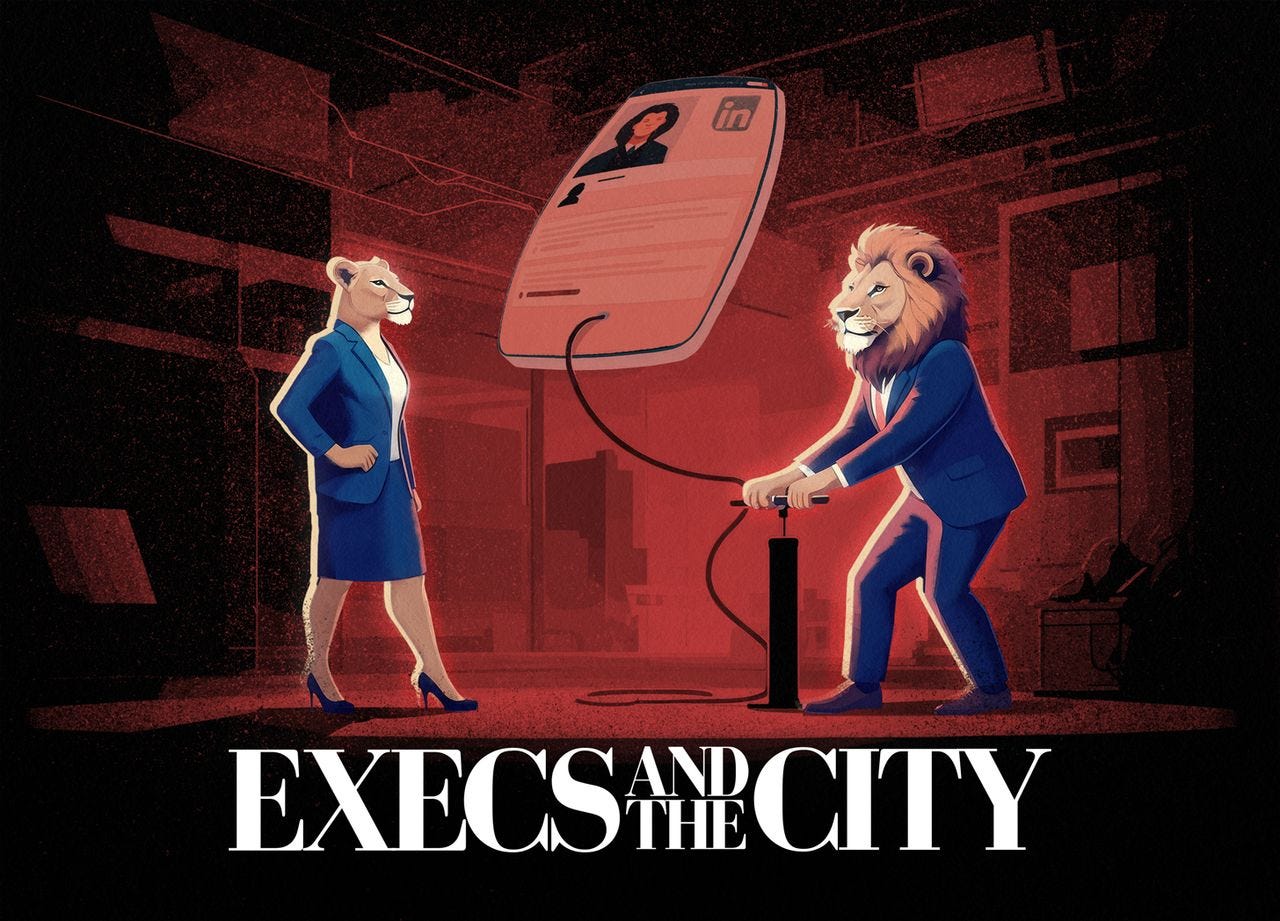What Nobody Tells You About Title Inflation
The psychology behind title inflation and the narrative control tactics that turn perceived career regression into strategic positioning.
Between ‘21 and ‘23, the job market handed out inflated titles like participation trophies—and now the bill has come due.
Remember when recruiters wouldn’t stop calling you?
When LinkedIn was buzzing with friends announcing their latest promotions every few weeks?
Our recent employee-driven market contributed to widespread title inflation as companies competed desperately for talent. Many tech workers fielded 5+ recruiter inbound inquiries weekly, driving up both expectations and titles.
“Senior,” “Principal,” “Chief,” and “VP” became the baseline, not the exception.
I realize that I’m aiming a jagged stone at my readers while standing in a glass house. I became a VP of Marketing at 26, managing exactly three people. I fought for that title like I deserved it—arrogance or youthful naivety, you decide.
Was I VP talent?
Of course not.
Especially as I have come to know some of the strongest senior leaders in the world.
After being outed as an imposter VP, re-entering the workforce proved hellacious and cutthroat. I was just another baby-faced buck-a-roo claiming go-to-market expertise—getting in the room, but not much further.
The skeptics saw right through my strong desire to be right.
My now close friend and mentor, Kayden Kelly, was the first to dish me a serving of humble pie, for which I am now grateful.
Fortunately, the market’s relentless rejection pushed me to entrepreneurship and the rest, as they say, is history.
But I fear that others won’t be afforded the same luxuries and opportunities that I had back in 2016.
Thousands of professionals pushed for and accepted inflated titles during the 2021-2023 period—Director roles without departments, VP positions without strategic authority, and senior titles with junior-level responsibilities.
It wasn’t foolish; it was the rational response to an irrational market.
Today’s market correction has left many of those same professionals with inflated titles in the most challenging job search environment in 25 years.
Like homeowners who paid $300K cash over asking in 2021, many executives are discovering their titles don’t translate to market value in 2025—and refusing to acknowledge this correction is extending unemployment and stalling careers.
I am forever an advocate for you—I do not judge your ambition. After all, it takes one to know one.
My intention is to support you tirelessly and help us all rise together. Not kick you while you’re down. But to do so, we need to have an honest discussion about expectation setting and how titles impact perception—which most tangibly impacts our collective reality.
If any of this is ringing a bell, your 2022 title may be your 2025 career problem.
What if the path forward isn’t defending your inflated position, but repositioning it for leverage in the market that actually exists?
The Title Inflation Crisis and the Narrative Solution
Research from Datapeople reveals a stark story.
Analysis of millions of job postings shows that 25% of technology jobs considered junior-level in 2019 now carry senior titles.
The use of “Lead” in job descriptions for early-career tech roles has tripled, while “Junior” has been cut in half between 2019 and 2023 according to research from compensation platform Ravio.
Their analysis reveals that startups commonly use senior titles like VP, Director, and Head of as substitutes for competitive salaries, creating organizational confusion and pay equity issues.
Which I suspect perpetuates the dreaded startup death spiral we discussed in June.
The report emphasizes that companies typically need structured job architecture around 100-200 employees to prevent these problems from compounding. And we all know that doesn’t always happen.
It begs us all to ask hard questions.
How does someone find the real senior leadership signal through all of this noise?
Is the rise of AI perpetuating this nonsense by making people all look the same?
How does the problem differ from startups to midsize or midsize to large corporations?
How do YOU stand out in this chaos?
How We Got Here
The 2021-2023 period created a perfect storm for title inflation.
Remote work exploded talent scarcity in key markets. Companies competed on titles when budgets couldn’t support compensation increases.
The tech sector normalized “Senior” and “Principal” roles for professionals with 2-3 years of experience. Social media platforms like LinkedIn amplified title-based personal branding, making your job title your primary form of social currency.
There’s likely generational momentum behind this trend as well—many of us came of age expecting faster career velocity than previous generations, so these inflated expectations became our baseline. Which makes the current correction especially jarring.
What We Face Today
Too many professionals are still operating with 2022 assumptions in a 2025 reality.
Hiring managers scrutinize inflated titles with forensic precision.
Companies can afford to be selective, prioritizing substance over status.
The “VP with 3 direct reports” problem has evolved from an inside joke to an immediate red flag that can eliminate you from consideration.
There is a lot of noise to filter out.
The deeper challenge may lay in American society’s relationship with identity.
You are what you do.
When someone asks “What do you do?”
It seems like they’re really asking “How do I evaluate your worth to me?”
Our capitalist framework demands constant upward trajectory—anything that doesn’t align with this “up and to the right” mentality feels fundamentally wrong.
Toxic positivity culture has made admitting these changes feel like personal defeat, while LinkedIn and Instagram feeds reinforce the illusion that everyone is still climbing.
This creates a psychological trap where stepping back feels like public failure, even when it’s the most strategic and personally empowering move available.
I’d add that this problem is also perpetuated to today’s leaders who grew up with overbearing parents—expecting greatness and perfection every step of the way. It’s like their love for you was conditional on your success and how you made them look as parents.
As a parent to two young boys now, are you f’ing kidding me?
It’s not just American culture.
Other cultures magnify this feeling of perceived greatness at any cost.
I once worked with a brilliant and affluent engineering leader worth north of $50M. They expressed that their parents never approved of their life choices because they didn’t become a doctor or a lawyer.
Nothing else mattered. They were a disgrace to their family.
Let’s get one thing clear.
Your career is about you and what you actually need—not what anyone else thinks you should need.
Maybe that’s building generational wealth that lets you sleep soundly at night. Maybe it’s flexibility to care for aging parents who sacrificed for you. Maybe it’s stepping back from the executive grind to coach Little League and be present while your kids still want you around.
Hell, maybe it’s earning enough to disappear into fantasy novels about wizards and dragons instead of forcing yourself to read another thought leadership post about market disruption.
Your career is not about impressing people who forget you exist the moment you leave the room.
The Hidden Leverage In Your Narrative
Most people miss that you can still generate leverage if moving into a new role in 2025 even if long term unemployed or navigating an inflated title.
You don’t necessarily have to accept downward pressure financially; even if you feel it elsewhere.
It’s just not necessarily from title leverage—it’s from narrative leverage and connecting to your impact/outcomes for each opportunity.
While others defensively cling to inflated positions, as I once did too, you should position yourself as market-aware, adaptable, and focused on substance.
This isn’t about accepting less or admitting defeat. It’s about winning the story war before it’s fought against you.
Those winning right now aren’t those with the biggest titles—they’re those with the most compelling narratives about their value creation.
Your ability to read the current conditions and position accordingly isn’t a weakness; it’s exactly the kind of leadership intelligence that companies need right now.
Success isn’t defending your inflated position—it’s repositioning it through narrative power that shows the business intelligence hiring managers actually want to see.
Why This Hurts (And Why That’s Normal)
The psychological pain of confronting an inflated title isn’t weakness—it’s a predictable response to how our brains process identity and loss.
Research from the Journal of Neuroscience reveals that our brains lock onto initial impressions and use them as powerful filters for all subsequent information.
When your professional identity becomes fused with a title that doesn’t represent your impact in today’s market, challenging that title can feel like challenging your worth as a person.
Stepping back from a “CPO” role to a “Sr. Director of Product” position isn’t just a career move; your brain processes it as losing something you’ve already earned, even if that title was inflated from the beginning.
And what’s more wild—I know a lot of Directors that earn 7 figures a year. Much more than many C-suite leaders I know.
Titles really can be a pain in the arse.
Add if you’re like many of us who identity your self-worth as an individual with your professional achievement—you’re fighting against deeply embedded social conditioning.
No wonder the thought of “downgrading” creates such visceral resistance.
Three Psychological Traps Keep You Stuck
Most professionals dealing with inflated titles fall into predictable psychological patterns that actually make their situation worse:
The Sunken House Syndrome
Like homeowners who refuse to sell underwater properties, you’re holding onto a title that’s lost its market value because selling feels like admitting you made a mistake. This creates “defensive framing”—you spend energy explaining why your inflated title was legitimate instead of repositioning for today’s reality.
When you only have 15 minutes to woo a recruiter or a 30 minute chat with a hiring manager—all of the energy you now must dedicate to defensive framing is a distraction from where you’re headed next and the value you generate.
The Comparison Trap
You’re measuring your worth against the market and LinkedIn posts from 2022, when your peers were getting promoted every 18 months. But comparing your reality to peak times is like a day trader lamenting that they’re not making 2021 crypto gains in 2025.
It’s not a good look, especially if you’re targeting roles where your job is to understand the market.
Remember, comparison is the thief of joy.
The Narrative Prison
You’ve built a story around a constant upward trajectory that makes any step back feel like plot failure. This narrative becomes self-defeating because it prevents you from taking smarter moves that would more meaningfully advance your long-term career.
Dozens of top senior leaders I have worked with will express the ‘hiccups’ in their career—like when their earnings dropped 70% to survive the dot-com bust—or when they dropped two titles during the ‘08 market implosion.
They’ll say this to a confidant like me in private—but when an outsider scans their LinkedIn profile, you wouldn’t know it.
Everything is clean. Everything is linear. Everything is up and to the right.
Your Hidden Leverage Through Psychology
What most people miss is that you still have significant power even in these tricky situations—it’s just psychological power rather than title power.
Research from the Journal of Personality and Social Psychology shows that people become psychologically invested in narratives they help create.
When you control the story around your career transition—positioning it as deliberate repositioning rather than forced retreat—and ask interviewers for their take on it, they become invested in that narrative being correct. I’ll elaborate.
The Neuroscience of Narrative Control
Your brain’s confirmation bias works in your favor when you control the initial narrative.
If you frame your transition as a choice rather than forced compromise, not only does this help you present more confidently, but hiring managers will look for evidence that supports your thinking.
If you frame it as retreat, they’ll look for signs of limitation.
The choice is yours.
Your path forward requires three practical moves that show business maturity rather than defensive positioning.
Phase 1: Audit Your Professional Story
Review your LinkedIn profile and resume with brutal honesty. Look for titles that scream “startup inflation” or responsibilities that don’t match your claimed seniority. You have three ethical options for each inflated role:
Remove entirely if it adds no real value to your story
Adjust the title to match actual responsibilities (“VP Marketing” becomes “Head of Marketing” if you had no direct reports)
Strip the context and remove explanatory details like “Led marketing initiatives (team of 3)” or “VP-level role in 50-person startup.” Leave it clean so you can control the narrative during phone screens and interviews.
The goal isn’t deception—it’s strategic positioning that gets you into conversations where you can show your value before assumptions are made based on inflated titles alone.
I recommend addressing these changes proactively during a conversation.
The key insight here is that you’re preventing premature filtering while maintaining integrity.
Rather than having your profile forcing you to tell a defensive story (“I know this looks inflated, but...”), you’re creating space to tell your strategic story in real-time conversations where your expertise can shine through.
This approach also prevents the common trap of over-explaining on your profile, which often makes the inflation problem worse by drawing attention to it before you’ve had a chance to establish credibility.
Phase 2: Master the Repositioning Conversation
Your narrative can not be an apologetic retreat.
Here are the conversations to consider:
For building shared identity: “You and I both know how organizations value seniority in their own way—can you help me understand how my work would fit with your organization?”
For getting ahead of the conversation: “I’m looking forward to our conversation today. What about my background is most exciting to you?” This lets you know what they value before you position yourself.
For the confident approach: “What about my background excites you—and what concerns you?” This shows self-awareness and signals that you’re focused on finding the right fit, not just getting hired.
For networking conversations: “I’ve learned that leveling varies between companies. I’m focused on finding roles where my experience—managing X, leading Y —creates the most impact. What does that typically look like here?”
For addressing title inflation directly: “I was a VP at [Company], which I suspect translates to a different role in your organization—correct me if I’m wrong. Can you help me understand where someone with my experience typically fits?”
Notice how each script positions you as market-aware and confident rather than defensive.
The “what concerns you” question is particularly powerful because it demonstrates that you’re secure enough to address potential misalignments head-on, which builds trust and credibility.
This approach also differentiates you—most candidates hide potential misalignments during interviews, hoping they won’t be discovered.
By addressing them openly, you demonstrate confidence, emotional intelligence, and relationally minded thinking.
More importantly, when you ask the other party to help you understand their organization, you trigger them to guide and coach you toward the right answer.
This activates the commitment psychology we discussed earlier—once they participate in creating your positioning narrative, they become psychologically invested in your success.
You’re no longer just another candidate being evaluated; you become someone they’re actively helping to succeed.
That shift in dynamic makes creating more leverage frictionless—as you now work toward alignment as a collective team.
Phase 3: Target Strong Leaders as Mentors
One of the most under used strategies is positioning yourself as a powerful number two to an exceptional leader.
This requires humility, but it’s incredibly effective for several reasons:
Strong leaders appreciate self-aware professionals who understand current business dynamics. They become advocates for people who show thoughtful leadership over ego protection.
Most importantly, they can provide air cover for your transition while accelerating your actual skill development.
Your high-level positioning:
“I’m prioritizing opportunities to learn from other seasoned leaders while contributing at a high level and building on my track record. My focus is skill alignment and leadership development over all else.”
The Mentor-Leader Strategy
I’ve watched many successful professionals make a transition this year by actively seeking roles where they can learn from exceptional leaders. This isn’t career regression—it’s smart positioning under someone who can accelerate your development and advocate for your advancement.
Your research questions:
“Who are the strongest leaders in this organization?”
“What’s their leadership style?”
“How do they develop their teams?”
“Given what you know, how am I similar or different to them?”
Your interview positioning:
“I’m looking for opportunities to contribute immediately while learning from experienced leadership and taking challenges off of their plate with confidence. A combination of impact and growth is what’s most important to me right now—not necessarily maintaining the title I held at my previous organization.”
Salary Negotiation Without Title Defense
When compensation conversations arise, avoid defending your inflated title’s historical connotations. You may be surprised to learn that lesser titles in larger organizations pay significantly better than you thought.
It’s best to let them do the talking first—then we counter meaningful later.
Even after an employer anchors with their initial offer, 20-40% improvements are common—and achievable without risky negotiation moves.
Instead, focus on current contribution and value creation:
“I’m confident we can find compensation that reflects the value we’ll create in this role. Can you help me understand where we should start?”
This positions you as realistic about current realities while maintaining confidence in your value. For more detailed salary negotiation scripts, review our full negotiation guides.
Implementation Reality Check
Test your positioning with trusted contacts before your next high-stakes conversations. Role play with others in communities you frequent or from colleagues you worked with previously. Ask them to be hyper critical.
Pay attention to their reactions:
Confusion or concern = your positioning needs clarity
Questions about “why you’d step down” = you’re still sounding defensive
Interest in your strategic thinking = you’re showing market sophistication
The goal is conversations about your future contribution, not explanations about your past titles.
Your inflated title—whether real or simply perceived—isn’t a career liability—it’s proof you lived through an unusual period. Position the chaos as another notch in your experience, not career baggage, and watch how differently people respond.
In fact, approaching this moment with uncanny self-awareness and authenticity isn’t just a tactic for your next interview—it’s the first step toward changing the game for everyone.
We start this change with strategic authenticity, using our real challenges to build trust instead of hiding them.
As we gain influence, we can use it to champion skills over status in hiring and transform our networks from exclusive clubs into supportive communities.
Each authentic story shared and every door opened for someone else is a quiet rebellion that helps build a system where genuine impact matters more than a perfect narrative.
Embracing this bigger mission isn’t just idealistic—it’s your ultimate competitive advantage.
Own Your Strategic Advantage
That inflated title you’re worried about isn’t a career liability—it’s evidence you lived through an extraordinary period.
You advocated for yourself then, and even if that title is a hurdle today, it’s not a reason to stop. It’s an opportunity to advocate differently—for yourself and for others—by strategically massaging your narrative to fit the game as it’s played now.
The professionals winning right now understand that adaptability beats ego every time.
Your willingness to step back strategically shows the kind of business maturity that seasoned leaders recognize and value.
And because you don’t have to exhaust so much energy defensively posturing or praying that it doesn’t come up in your next interview—you’ll be better able to listen to the challenges companies express during interview cycles and connect your value more acutely.
This isn’t about accepting less—it’s about positioning for more.
The right mentor, the right role, and the right narrative can accelerate your career faster than defending an inflated title ever could.
The market has reset. Your competition is still fighting the last war while you’re positioning for the next one. That’s not retreat—that’s competitive advantage.
Stop defending yesterday’s titles. Start building tomorrow’s opportunities.
When you land that next role and find yourself on the other side of the hiring table—remember this moment.
When you see a candidate with a potentially inflated title, extend the grace you wish you were given now. Ask questions that look past the title and focus on their actual impact and potential.
Consider how they address the situation—do they show the self-awareness and strategic thinking this article encourages?
The Golden Rule is the ultimate career strategy.
The empathy you show as a leader will build a stronger, more resilient team than any perfect resume ever could.
Need help applying this? Upgrade to paid for monthly live sessions with Jacob.
Stay fearless, friends.










"“Those winning right now aren’t those with the biggest titles—they’re those with the most compelling narratives about their value creation.”